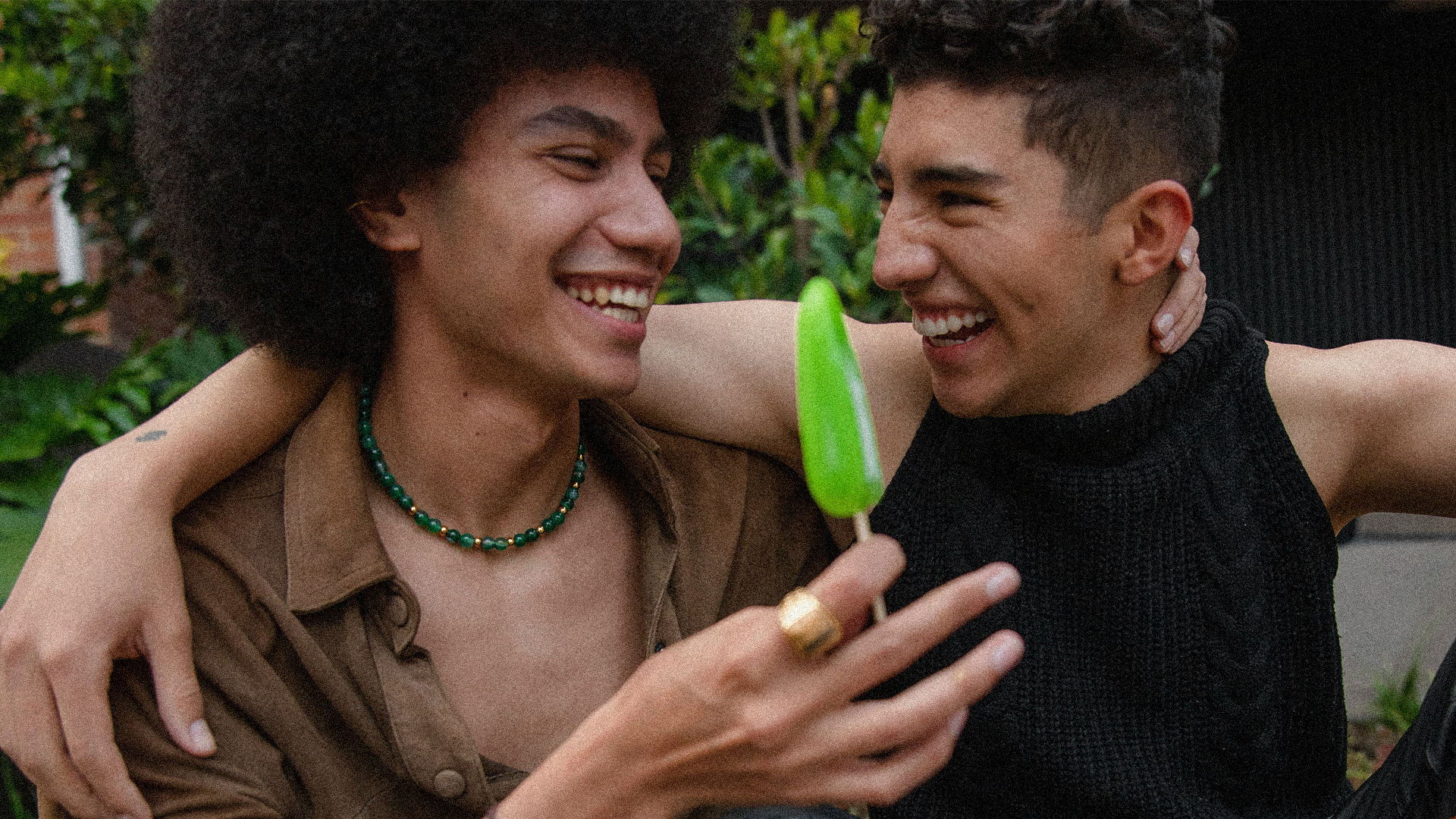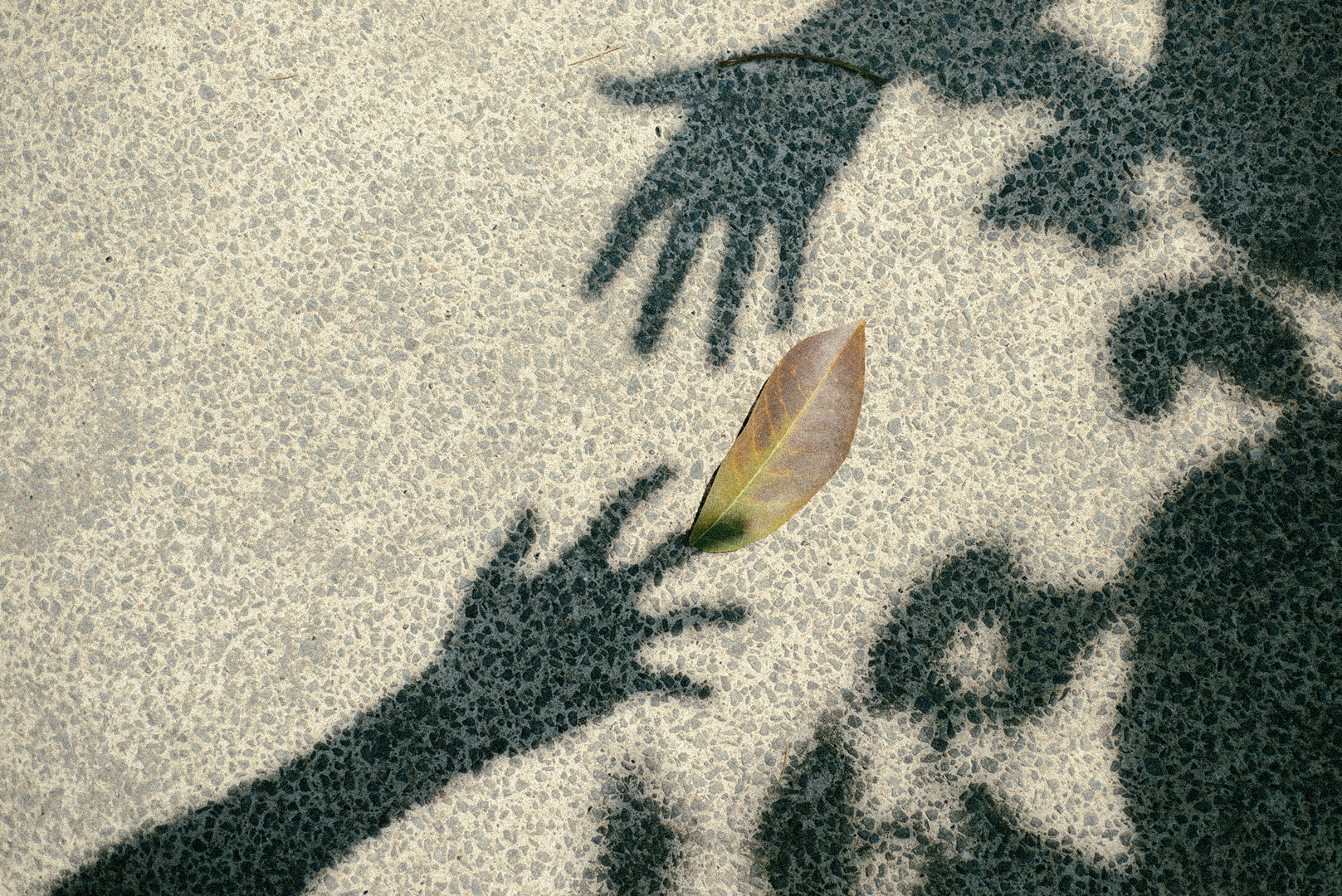Aromanticism and friendships: How to navigate the fine line between romantic and platonic relationships

It’s not always easy to tell where one kind of love ends and another begins. We’re humans, after all: We’re messy, nuanced, complex, beautiful. And so are the ways we experience connection.
Platonic love has long been understood as the kind of love we share with our friends, while romantic love has been considered something “more.” However, research shows that 66% of all romantic relationships start as friendships—and that figure climbs as high as 85% among the LGBTQ+ community, according to the Social Psychological and Personality Science journal.
Plus, heteronormative culture can make it especially hard for queer and sexually nonconforming folks to separate and identify their feelings. For those on the asexual and/or aromantic spectrum, the line between romantic and platonic love can feel especially fine. That’s not just because these types of love are fluid, but because many of the societal cues we’re taught to rely on—things like physical affection, emotional intensity, or exclusivity—don’t always align with how arospec people experience attraction or build relationships. Heteronormative and alloromantic expectations can compound this confusion, making it even harder to name or navigate feelings that don’t fit neatly into one box or the other.
The reality is, both romantic and platonic relationships can look different for everyone. The nuances are open to negotiation; it’s about figuring out what each type of love means to us, and the roles we want them to play in our lives.
So let’s talk about it—including the gray areas, the overlaps, and the bonds that don’t fit wholly into either box.
What’s the difference between friendship and romantic love?
Look up the difference between friendship and love, and many results will define the former as an absence of romance or desire: affection, affinity, and emotional closeness with a person, but without sex, attraction, exclusivity, or a commitment to “building a life” with them.
Romance, on the other hand, has traditionally been defined as involving all of these things. But these definitions don’t exist in a vacuum. We’re taught them—through media, pop culture, and social norms that treat romance as the most meaningful kind of love. Movies turn best friends into soulmates. Sitcoms say men and women can’t “just” be friends. We hear that if you’re close to someone attractive, something more must be going on.
But these definitions often fall short, and don’t reflect everyone’s reality. For some (e.g. those in queerplatonic relationships), a non-romantic love can be the most committed and enduring partnership of their life. Asexual folks or trauma survivors may experience romantic love without any sexual desire. Poly folks may pursue love and sex freely with multiple people. Friends can have sex without romance. The overlaps go on.
Ultimately, the difference between friendship and love isn’t fixed. It’s something we can define for ourselves. So, if certain traditional dynamics (e.g. sex) aren’t distinguishing factors of romance for you, think about what might be.
For example, as one member of the Asexual Visibility and Education Network (AVEN) explains, “For me, romantic love involves a desire for emotional closeness and sharing [of] life that platonic love doesn’t… [It’s] commitment to a level of partnership that I wouldn't want with a friend.”
Another ace member cites various factors that sets romantic love apart from friendships for them: “I feel a need/urge/desire/fantasy to kiss them… I want to touch their thigh… I want to be important to them, and they are important to me.”
But it’s also worth noting that some people don’t experience romantic attraction at all (what’s referred to as “aromantic.”) This is totally normal, too; aromantic folks can live a just as rich, love-filled, and connected life as anyone else.
Non-romantic love, and defining loving friendships
Our culture tends to place romance at the top of a supposed “intimacy hierarchy,” positing it as the pinnacle of human connection; the end goal of everything. But often, in reality, friendships can be the biggest love stories of our lives—whether we experience romantic attraction or not. And research shows that friendship is crucial for our wellbeing, according to studies shared by the American Psychological Association.
In the words of Diane Barth, a psychotherapist and friendship specialist, “We don’t have nuanced words for that kind of deep, deep, deep caring and connectedness [between friends].” But it’s there all the same.
Picking each other up through bad times. Cheering each other on through good ones. Remembering important dates. Laughing over niche memes. Simply feeling seen and understood in their presence—this is love. Rich, deep, and fulfilling love. And it’s in no way “lesser” than romance.
“I have never experienced romantic love, but I have lots of friends who I love, [who] I would give my life for,” says an aromantic AVEN member. “We hug and kiss, even hold hands, but there's no feelings of being any closer than close friends.”
“Non-romantic love exists,” emphasizes another member, “as well as snuggling, talking, kissing, and living together outside of romantic relationships. You don’t have to be in love to feel love.”
Where are the boundaries of platonic friendships?
One person’s loving friendship might look like another person’s romantic relationship—and vice versa. So again, it’s up to you to identify and communicate what feels good: be it about how much time you spend together, what kinds of intimacy you share (physical, emotional, or otherwise), or how you prioritize one another in your lives.
Sometimes, a bond is so strong that it feels like it transcends typical friendship. Enter queerplatonic relationships: profound connections that go beyond friendship, but aren't quite romantic. In the words of pleasure educator Carly S, "It's like finding a soulmate who completes you in every way, but you don't want to date them… It's somewhere between a BFF and a chosen family member."
But what happens when the boundaries of platonic friendship start to blur? When you’re unsure whether what you want from a friend is actually romantic territory? It’s a common question among folks on the aromantic spectrum, or anyone unpacking traditional ideas about love.
Try asking yourself:
- How do I want to relate to this person? Do you feel a special kind of draw towards them? Do you want to feel “chosen” or prioritized by them? Do you like the idea of building a life with them? If you enjoy physical intimacy in any capacity, do you imagine touching, kissing, or cuddling them?
- Is this a pattern or something new? Does this closeness feel similar to other loving friendships, or is it different with this person? What is it, specifically, that’s different?
- How would I feel if they were romantically committed to someone else? Plenty of people are happy to be non-exclusively romantic—so it’s not necessarily unromantic if you don’t feel jealous when you see them with others. But you might find yourself thinking, “I’d like to feel committed to each other in that way, too.”
When platonic friendships change
As we mentioned, two thirds of romantic relationships start as friendships, and that number’s even higher for LGBTQ+ folks. Feelings and boundaries shift all the time. Cue excitement. Curiosity. Confusion. Maybe fear.
You’ve got someone here who already knows and cares for you—a great foundation for a romantic relationship. But the stakes can feel high: there’s the risk of unreciprocated feelings, or losing the friendship if things don’t work out.
“I heard a song and the lyrics just hit me… [I realized] I was in love with my best friend,” says one Reddit user, reflecting on when it clicked for them. “When I told him, he didn’t want to risk our friendship, but then he changed his mind like two days later. We’ve been together for over 17 years now, and he’s still my best friend.”
Sometimes, of course, it won’t work out. And that’s okay. “I met my best friend when we were teenagers,” says another Reddit poster. “I think I realized I liked her when I saw how sad I was at the fact we couldn't talk much because my family disapproves of long distance friendships… After some time we tried a relationship out. Didn't even last a month, but we're still best friends.”
Naturally, there will be stories of people struggling to remain friends after a romance didn’t work out, too. It happens. But if everyone’s moving with love, care, and honesty, that’s as much as you can ask from one another.

Can platonic soulmates fall in love?
Platonic soulmates, platonic lovers, queerplatonic partners—these are all similar terms for people in deep, and to some extent committed, non-romantic love. That’s not to say it can’t ever become romantic, though.
People who once considered themselves platonic soulmates, or “platonic lovers,” can absolutely develop romantic feelings for one another. So, if you’re noticing new or shifting feelings for anyone in your life, these are signals worth exploring.
But it’s also okay to acknowledge that not every intense connection needs to be romanticized. Again, love between friends is just as valuable when standing on its own; it doesn’t have to be a prelude to something “more.”
Navigating romantic feelings in platonic relationships
First, sit with your emotions
You don’t need to do anything right away. Instead, take the time and space to process your feelings. Try journaling, or talking it out with someone you trust. Ask yourself, are these feelings consistent or fleeting? Are they rooted in longing, desire, a craving for commitment—or something else, like loneliness or cultural pressure? How will you feel if it’s unreciprocated? Are you ready for that?
Think about what you actually want
If you choose to share your feelings, it can be helpful to go in with an idea of what you’d like to happen next.
Do you want to pursue a romantic relationship (and if so, what would that look like to you)? Do you need some emotional distance to work through things on your own? Would it help to simply name the feeling at this point, and put where you’re at on the table?
If you decide to share, be clear but gentle
Try something like: “I really value our friendship, and lately I’ve been feeling something more. I don’t want to cross a boundary, or mess up what we have—but I wanted to be honest and check in with you about it.”
If you do want to pursue a romantic connection with this person, ask them if they’d be open to that. If you need space, tell them. If you don’t know what you want, you can say that, too.
Be ready for any outcome
They might feel the same. They might not. Or they might be unsure. All of these responses are valid—and none erase the love and care between you. Rejection can hurt, but it doesn’t have to mean the end of the friendship.
Take the space you need. Let things settle. And know you can get back to what you had, if you want to.
Remember that love isn’t a one-size-fits-all
Love between friends can be real, deep, and fulfilling. It doesn’t need to be romantic in order to complete us. Period.
Ultimately, both platonic and romantic forms of love (and all the others in between) are equally as real, meaningful, and valuable—like different shades of a color. Sometimes they bleed into one another, too.
So, whether you’re navigating romantic feelings for a friend, deepening a platonic relationship, or redefining what friendship and love mean to you altogether, remember that what matters most is care, communication, and consent.
Take time to reflect on what you want from the people in your life—and what you want to give them in return. Open up to your friends, talk to a therapist or counselor if it feels helpful, and connect and chat to people who get it on Feeld. You can explore more of our articles, too, including our guide to understanding the aromantic spectrum, or check out resources from charities like Stonewall and AVEN.
And finally, try to embrace the fact that love, of any kind, doesn’t always come with a clear map.


